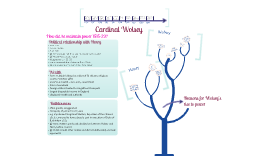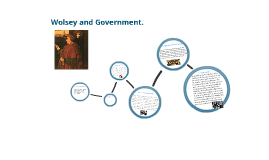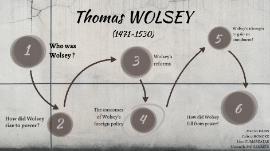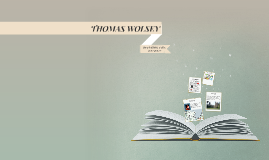Wolsey
Transcript: Edward Hall Polydore Vergil Vergil will be not be completely reliable in his writings about Wolsey. The main reason for this was because he believed that Wolsey did not treat him equally to other humanists. Because of this, he sent letters to Rome, trying to stop Wosey being made Cardinal; however when Wolsey discovered this, he sent Vergil to the tower. Because of this, Vergi had an ongoing grudge against Wolsey, and so his writing may be biased. John Skelton "Wolsey was an opportunist. He was able to adapt his views and ideas to fit those of the King." He was am artists, and so he would have wanted to sell his poems, and gain in popularity. Therefore, although his poems are lightly based on truth, there is the possibility that he would have taken the slightest rumour, or hint of an interesting story, and spun it out of proportion, merely to get both public support, and money. He was Henry VII's Poet Laureate, and Henry VIII's tutor. He was a well known poet among the higher classes of London, and was enjoyed because of his satirical languaged used in his work. Criticism Here, Vergil chooses to portray Wolsey as being manipulative, using Henry to get what he wanted. He describes Wolsey like this in a negative manner, because he had a personal feud with the Cardinal, and so would not want to influence the reader to hold Wolsey in high regard. Although Hall had no personal grudge against Wolsey, he was highly anti-clerical. This meant that he was against the chuch, and so would have, politically, not fully supported Wolsey. He was against any unions with mainland Europe, and as he believed that England was a strong enough country to support itself. He was the personal servant of Thomas Wolsey, however he was only a personal servant, and was not told about his master's political work. Therefore, when reading what he had said, all we can find out is about what Wolsey was like in his private life, and nothing about the steps he took when creating new policies. Useful Useful Useful "Everytime Wolsey wished to obtain something from Henry...he brought out a small present...while the King was admiring the gift intently, Wolsey would adroitly bring forward the project" Useful "His increasingly ostentatious displays of wealth did, however, damage both his personal reputation and that of the church." This shows that although he did not have a dislike of Wolsey as such, he just believed that he should, as a member of the church, live a little less lavishly, and give more of his fortune the the poorer and more needy. All of his satirical poems would have been based on some truth. Therefore he will be able to let us know how the people saw Wolsey, in the more extreme circumstances. The poems will have been written in a contemporary format, and so will also have shown the general mood towards Wolsey at different points during his reign. "So rygorous revelyng, In a prelate specially; So bold and so bragging, And was so baselye borne; So lordlye of his lokes," This is one of Skelton's satirical poems about Wolsey, he says that Wolsey is 'bold and bragging', and so obviously believes that Wolsey was a manipulative yet vain induvidual; although this only may have been written in order to sell. Jasper, Matt and Josh made the presentation You could argue that this was not alsways the case however. Vergil had a reputaion to uphold, and so may not have been quite as biased as some historians believe. He is also useful in the sense that he was around for the entirety of Wolsey's reign, and so we can read his writings and see how Wosey had changed policies over the years. Edward Hall was a contemporary historian. He was not close to Wolsey, yet he held no personal grudge against him. He was a strong francophobe, however, and so did not agree with Wolsey's union with France, and was against many of his clerical actions. Criticism Cavendish was Wolsey's household servant, and his first biographer. He was loyal to his master, and even wrote him a biography, 'Life and Death of Cardinal Wosey'. Although he was a servant of the Cardinal's, he was not under his command for the entirity of his reign, only entering his house seven years after Wolsey because Lord Chancellor, and so his reliability and validity is argued. He was an unbiased source, and was also there at the time. He can be a useful source to read when you want to learn about Wolsey's political actions at the time. He also had no personal grudge against Wolsey, and so he is already more reliable than Vergil, and he will often show both sides of Wolsey's decisions. Vergil was a Italian humanist, who already had a reputation of being a fine scholar. He remained in Henry VIII's court throughout the entirety of Wolsey's reign. However, he is arguably not a very reliable source, as he had a feud with Wolsey, and so may have been biased in his writing. George Cavendish Of course, being this close to Wolsey, he can be useful when talking about how Wolsey reacted when he was stripped

















